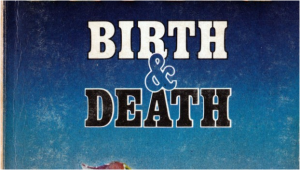================================
SEEKING THINGS ABOVE
“If then you were raised with Christ, seek those things which are above,
where Christ is, sitting at the right hand of God. “(Col. 3:1)
Volume II Number 11
February 2022
================================
Which Is Better?
(Ecclesiastes 7:1)
Mike Johnson

“A good name is better than precious ointment, and the day of death than the day of one’s birth” (Eccl. 7:1). The first part of this verse is what one would expect to find in the Scriptures (also note Pb. 22:1). However, the second part might cause people to be puzzled. How can it be? How can the day of death be better than the day of a person’s birth? Someone reading this might even express disagreement. Is Solomon putting down life or the joy of a person’s birth into God’s creation? The answer is “no.” The sense in which this is true is that our death, as a righteous person, has many advantages over our birth and is actually better.
Consider some contrasts between the day of our birth and the day of our death.
- When we are born, we face an uncertain future, but the righteous do not die with uncertainty. James 4:14 reminds us, “whereas you do not know what will happen tomorrow. For what is your life? It is even a vapor that appears for a little time and then vanishes away.”
- We are born facing the burdens of living in the flesh, but on the day of our death, we gain freedom from that burden. 2 Corinthians 5:4 assures us, “For we who are in this tent groan, being burdened, not because we want to be unclothed, but further clothed, that mortality may be swallowed up by life.”
- When the upright die, they are no longer absent from the Lord. In 2 Corinthians 5:6, Paul says, “So we are always confident, knowing that while we are at home in the body we are absent from the Lord.”
- When righteous people die, they continue to teach others after death. Able, for instance, because of his good example, continues to teach about faith and proper worship after his death (Heb. 11:4). We learn from Revelation 14:13 that a voice from Heaven told John, “. . . Write: ‘Blessed are the dead who die in the Lord from now on.’ ‘Yes,’ says the Spirit, ‘that they may rest from their labors, and their works follow them.’” Works follow us in that we face the consequences of them (2 Cor. 5:10), but also the impact of the lives of the righteous continues to have a positive influence after we are gone. We do not teach lessons in this way by simply being born.
Consider some more biblical concepts.
The Death of a Saint is Precious
Psalm 116:15 informs us, “Precious in the sight of the Lord is the death of His saints.” People think of death in many different ways. The death of a loved one is one of the greatest agonies people typically face in their lives. We think of losing a loved one in terms of heartache, tears, sorrow, and pain. Yet this passage says the death of a saint is precious in the sight of the Lord! This verse looks at death more from God’s perspective. God delights when people become Christians — there is rejoicing in heaven. He also delights in our progress and finally sees our death as coming home to Him. To us, death is a departure; to God, a saint’s death is an arrival.
Consider a statement made by Paul in his letter to the Philippians 1:21-23. “For to me, to live is Christ, and to die is gain. But if I live on in the flesh, this will mean fruit from my labor; yet what I shall choose I cannot tell. For I am hard-pressed between the two, having a desire to depart and be with Christ, which is far better.” At this time, Paul was in a Roman prison expecting to be released. He stated that if he lived, he would continue helping the Philippians. However, if he died, he would be able to depart and be with Christ, which, he says, would be far better than life upon the earth.
When faithful Christians die, they can look to God as welcoming them to their new home. We cannot say this of our birth, so another reason why the day of our death is better than the day of our birth is that our death involves going home to God, which is “far better” than life on earth.
Death Involves Removal from Evil to Peace
Isaiah 57:1-2 tells us, “The righteous perishes, and no man takes it to heart; merciful men are taken away, while no one considers that the righteous is taken away from evil. Therefore, he shall enter into peace; they shall rest in their beds, each one walking in his uprightness.”
There is a contrast between the wicked and the righteous in these verses. The righteous die, and the wicked do not even note it. Others, especially evil people, do not even think about why the righteous die. Our text tells us they are taken away from evil. (The NIV says, “to be spared from evil.”) How many times have you heard it said of a deceased person after a particular event, “It is good they did not live to witness this”?
For some people, life is better than for others. Still, life on earth involves passing through a place of hardships (Job 14:1-2) to a state of peace. Our birth brings us into a world of trouble; our life takes us away from it.
Our Death Involves a Trip to Paradise
While on the cross, nearing death, Jesus said to one of the thieves, “. . . Assuredly, I say to you, today you will be with Me in Paradise” (Lk. 23:43). On that very day, Jesus and the thief would be in Paradise, a part of Hades (Acts 2:27). From the story of the rich man and Lazarus, we see when Lazarus (the poor man) died, angels carried him to Abraham’s bosom (the paradise part of Hades), and the rich man went to the torment part (Lk 16:22-23).
People use the word “paradise” very loosely today. But, if God calls a place “Paradise,” we know it is a desirable place for us to go. When faithful Christians die, they will go there and will ultimately go to Heaven — a place of joy, rest, and peace. Heaven will be far greater than anything we can imagine! Since our death starts this process, we have another reason to understand how our day of death is better than our day of birth.
To understand how the day of our death is better than the day of our birth, we must look at it from a different viewpoint, i.e., from God’s perspective. First, it is essential to understand that the writer speaks of the righteous — those who are saints (1 Cor. 1:20). For those who do not serve God, the day of their death will not be better than their day of birth (2 Thess. 1:7-9, Mt. 25:46). Life on this earth is very short (Job. 14:1-2) — eternity never ends!
__________
Self-Control
Bill Hall

What is the value of self-control? Self-control is that which enables us to hold our tongues when we are tempted to viciously put someone in his place once and for all; or when we know a juicy bit of gossip that would be entertaining to the group and would turn us into the “life of the party”; or when an occasion almost demands that we betray a confidence that must not be betrayed under any circumstances.
Self-control is that which enables us to control our passions when another is provoking us to anger; that keeps the clenched fists in the pockets when the agitator is only half our size; that keeps the lips sealed when another is railing and swearing at us. Self-control is that which enables us to be like our Lord “who, when He was reviled, did not revile in return; when He suffered, He did not threaten, but committed Himself to Him who judges righteously” (I Peter 2:23).
Self-control is that which enables us to maintain purity of heart and to thrust out evil thoughts before they can take root; that enables us to place the best possible construction on another person’s actions when unproven rumors could easily destroy our confidence in him; that helps us to maintain a cheerful disposition when everything around us has turned sour. Self-control is that which enables us to love the unlovable and to hate that which the world loves.
Self-control is that which enables us to rule our appetites; to say “no” when our lusts would lead us to sin or when that which is harmful to our health is placed before us. Self-control is that which enables the smoker to put down his cigarettes and the alcoholic to put down his drink and never return to it. Self-control is that which enables us to rule rather than to be enslaved.
The Bible does not glorify the indifferent and impassive. It is not our goal to be uncaring. To be like Paul, we must be able to have our spirit stirred within us when we are surrounded by evil (Acts 17:16). To be like our Lord, we must sometimes feel anger when surrounded by hypocritical self-righteousness (Mark 3:5); we must even react with occasional outbursts of goodness on occasions, as when the Lord cleansed the temple (John 2:13-17). But, all such outbursts must be tempered with self-control, that in our anger we “do not sin” (Ephesians 4:26).
God does not view our uncontrolled actions with amusement. Our temper tantrums and harsh, unbridled words are soul-threatening, a potential bar to the abundant entrance into the Lord’s everlasting kingdom (II Peter 1:5-11). We must not minimize the danger. We must not surrender to this evil.
What is the value of self-control? It is one of the qualities that enable us to go to heaven. The possessor of it is rich indeed.
__________
The Possibility of Apostasy (4)
Making Your Calling & Election Sure
(2 Peter 1:5-11)
Mike Johnson
There are many passages in the Scriptures, which teach that a child of God can fall from grace. Advocates of the doctrine of the impossibility of apostasy often approach these passages in one of two ways. First, they say that a particular passage speaks about Christians, but it is not saying they are actually lost. Or, they say the passage has lost people under consideration, but these people never truly became Christians.
When approaching these verses, it would be incorrect to say that they do not apply to a Christian. Peter is speaking “to those who have obtained like precious faith with us by the righteousness of God and Savior Jesus Christ” (1). He says further they had received all things which pertain unto life and godliness “through the knowledge of him that hath called us to glory and virtue” (3). So also, verse 4 says, “by which have been given to us exceedingly great and precious promises, that through these you may be partakers of the divine nature, having escaped the corruption that is in the world through lust.”
Verse 5 starts by saying, “but also for this very reason.” This phase shows a connection to the previous verses. He is saying because they had received “exceeding great and precious promises” that allowed them to be “partakers of the divine nature,” and had “escaped the corruption that is in the world through lust,” they should be motivated to add the various traits listed in verses 6-8. So Christians are to do (10), or add (5), “these things.”
Also, verse 8 says, “For if these things are yours and abound, you will be neither barren nor unfruitful in the knowledge of our Lord Jesus Christ.” Someone who has a description as “barren” and “unfruitful” is undoubtedly in a lost state. (Note John 15:1-6.)
Those who lack “these things” are also described (v. 9) as “shortsighted” to the point of “blindness.” They are blind in the sense of being “spiritually blind,” unable to see as they should spiritually, i.e., to have the spiritual and moral perception they should. They can only see things near — those things of an earthly nature. The person would also have forgotten that “he was purged from his old sins.” Isn’t this sad? He would forget the most glorious event that had ever happened to him. He may remember his conversion, but he has forgotten its value and importance. He is in a state of spiritual ruin.
Verse 10 says, “Therefore, brethren, be even more diligent to make your calling and election sure, for if you do these things you will never stumble.” If there is no way saved people can be lost, what is the point of telling them to make their calling and election sure? How can it be made sure any more than it already is? Also, it says if a person does these things, he “shall never fall.” What if a person does not do those things, i.e., add the virtues? He would, of course, fall. Thayer, in his Greek Lexicon, describes the word translated “fall” (ptaio) to mean. “b. To fall into misery, become wretched . . . of the loss of salvation, 2 Pet. i. 10).”
Typically, those who believe in the impossibility of apostasy will argue that these verses, although speaking of a Christian, are not saying the person who fails to follow the instructions would be actually lost. In the Thrasher-Garrett Debate, Garrett said, regarding this passage,
That is, they shall not fall from their steadfastness nor lose that clear sight and assurance which they now are experiencing, namely, as being partakers of the divine nature and purged from their old sins, which those neglects might put out of their sight; and so lose them the sense and comfort of their salvation.
He is not speaking only of the “comfort” of their salvation in these verses. Instead, the passage is talking about their actual salvation. If a person does not add “these things,” he is described as barren and unfruitful in the knowledge of Christ, shortsighted and unable to see afar off, and as one who has forgotten about being purged from his old sins. He has not made his calling and election sure and has done the opposite of what a person must do to keep from falling. Does this sound like a saved person—someone headed to heaven? It does not!
Verse 11 also makes it clear he is not merely talking about the “comfort” of their salvation. Instead, it says, “for so an entrance will be supplied to you abundantly into the everlasting kingdom of our Lord and Savior Jesus Christ.”
Without a doubt, 2 Peter 1:5-11 teaches that children of God can fall from grace if they do not follow the instructions of adding these virtues to their faith.
__________
Unless You Let It In

All the water in the world
However hard it tried,
Could never, never sink a ship
Unless it got inside.
All the evil in the world,
The wickedness and sin,
Can never sink your soul’s fair craft
Unless you let it in.
All the hardships of this world,
Might wear you pretty thin,
But they won’t hurt you, one least bit…
Unless you let them in.
Author Unknown
Related Article: “Don’t Play With Sin”
__________A Love Story
|
There was once a little boy whose sister needed a blood transfusion. The doctor explained that she had the same disease her brother had recovered from two years earlier. Her only chance for recovery was a transfusion from someone who had previously conquered the disease. Since the two children shared the same rare blood type, the boy was the ideal donor.
“Would you give your blood to Mary?” the doctor asked. Johnny hesitated. His lower lip started to tremble. Then he smiled and said, “Sure, for my sister.”
Soon the two children were wheeled into the hospital room–Mary, pale and thin; Johnny, robust and healthy. Neither spoke, but when their eyes met, Johnny grinned.
As the nurse inserted the needle into his arm, John’s smile faded. He watched the blood flow through the tube. With the ordeal almost over, his voice, slightly shaky, broke the silence. “Doctor, when do I die?”
Only then did the doctor realize why Johnny hesitated, why his lip had trembled when he’d agreed to donate his blood. He’d thought giving his blood to his sister meant giving up his life. In that brief moment, he’d made the great decision.
Johnny, fortunately, didn’t have to die to save his sister. Each of us, however, has a condition more serious than Mary’s, and it required Jesus to give not just His blood but his life.
“For the love of Christ controls us, having concluded this, that one died for all, therefore all died; and He died for all, that they who live should no longer live for themselves, but for Him who died and rose again on their behalf.” (2 Corinthians 5:14-15)
(from “Illustrations for Preaching and Teaching“)
_____________________________________
Audio Message
Sermon
================================
Editor: Mike Johnson



